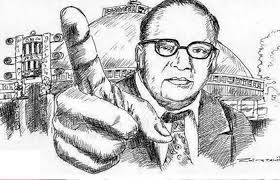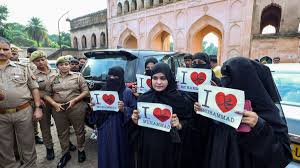
*Dr. Ambedkar, the pioneer of establishing an egalitarian society*
*Dr. Ambedkar, the pioneer of establishing an egalitarian society*
(Suresh Pachauri)
The proud son of Madhya Pradesh, Bharat Ratna Dr. Bhimrao Ambedkar, is the pioneer of establishing an egalitarian society and the architect of the Indian Constitution. Dr. Ambedkar’s life is a saga of struggles which understood humanity in its true sense and glorified history by establishing human dignity. Dr. Ambedkar was the biggest advocate of self-respect and social and economic equality of the weaker sections of the country. He was born on 14 April 1891 in Mhow, Madhya Pradesh. Born in the Mahar caste, Dr. Ambedkar touched the heights from the surface to the peak while being burnt in the furnace of inequality, untouchability, injustice, exploitation, suppression, hatred, contempt and pain.
Dr. Bhimrao Ambedkar was a man of sharp intellect and multi-talent since childhood. He passed his graduation examination in 1912. He did his M.A. in Economics from Columbia University, America, D.Sc. from London School of Economics and Doctor of Law degree from Columbia University. He was a thoughtful person and a Karmayogi. His life, his successes and achievements are proof in themselves that talent has no relation with caste. The important thing is that talent should get an open and free environment. His extraordinary organization capacity and his determination to fight against injustice easily establish him as a great historical figure. He has a special contribution in awakening awareness about human rights in the Dalit society. His clear message for the Dalit and weaker sections was – “Be educated, stay organized and struggle.” Dr. Ambedkar became the Law Minister of the country in the first cabinet of independent India. He was also a member of the Constituent Assembly and was made the Chairman of the Drafting Committee of the Constituent Assembly. Immediately after independence in 1947, when the fire of communal hatred was spreading, the biggest challenge was to make a constitution that would be acceptable to all. Dr. Ambedkar gladly accepted this challenge.
Dr. Ambedkar wanted to transform political democracy into social democracy. He was in favour of including protection against economic exploitation as a fundamental right in the constitution. Dr. Ambedkar enriched the Indian constitution with global struggles and experiences by moulding the best values and advanced provisions of world constitutions in accordance with Indian culture. The entire country remembers with great pride the contribution of Dr. Ambedkar as the architect of the constitution of independent India.
While drafting the constitution, Dr. Ambedkar kept in mind that independent India should travel its development journey as a united human society without being divided into castes and sects. Dr. Ambedkar made many such provisions in the Constitution, due to which not only the Dalit class but the entire human society got the right to live with equality. It was due to his efforts that untouchability was declared a punishable offence. Many provisions for social justice and betterment of the weaker sections were made in the Constitution.
The life and philosophy of Dr. Ambedkar is the basic mantra to give the right direction to social and economic reconstruction. He presented his views in the form of articles on many subjects like Finance Commission, RBI, Election Commission, water, electricity, grid system, women’s right to property etc. His then thinking on nation building, foreign policy making, labour welfare, agriculture and industrial development is still like a heritage for the people of the country.
Dr. Ambedkar, who had a multi-faceted personality, was a thoughtful journalist. He considered journalism as a medium of social justice. Underlining the need and impact of journalism, he had said, “Just as there are no birds without wings, there are no movements without newspapers.” Dr. Ambedkar himself started publishing the newspaper “Mooknayak” in 1920 through which he gave a national voice to human sentiments. The result was that the British ploy to separate Dalit society from Hindu society failed. The socio-economic questions raised by Dr. Ambedkar gave momentum and strength to the freedom movement.
Social harmony and equality in society were the central points of Dr. Ambedkar’s thinking, but it was not limited to Dalits or weaker sections only. He made tireless efforts to implement the Hindu Code Bill to give women property rights and to ban polygamy in Hindu society. It was a sign of his firmness towards principles that he resigned from the post of Law Minister when the Hindu Code Bill was not passed.
Taking a decisive step towards the creation of an exploitation-free society based on equality, he adopted Buddhism along with millions of his followers on 14 October 1956. At the holy Deekshabhoomi in Nagpur, he took a pledge that “I will follow the principle that all human beings are one. I will mold myself according to the three elements of Buddhism 1. Knowledge 2. Compassion 3. Morality.”
Under the guidance of Prime Minister Shri Narendra Modi, the Central Government has taken several steps to make the life and work of Dr. Ambedkar unforgettable. Prime Minister Shri Narendra Modi has planned to develop five places having deep connection with the life of Baba Saheb Ambedkar as Panchtirtha. These Panchtirtha are as follows.


